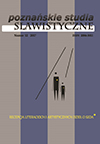The Holocaust in Slovak Drama
The Holocaust in Slovak Drama
Author(s): Dagmar KročanováSubject(s): Theatre, Dance, Performing Arts, Recent History (1900 till today), Cultural Anthropology / Ethnology, History of the Holocaust
Published by: Uniwersytet Adama Mickiewicza
Keywords: 20th century Slovak drama; contemporary Slovak drama; Juraj Váh; Peter Karvaš; Viliam Klimáček; Anna Grusková; dramatic characters; dramatic conflict;
Summary/Abstract: Kročanová Dagmar, The Holocaust in Slovak Drama. “Poznańskie Studia Slawistyczne” 12. Poznań 2017. Publishing House of the Poznań Society for the Advancement of the Arts and Sciences, pp. 197–210. ISSN 2084-3011. The article discusses several Slovak plays with the theme of the Holocaust; namely Ticho (Silence) by Juraj Váh, Holokaust (Holocaust) by Viliam Klimáček, and Rabínka (The Woman Rabbi) by Anna Grusková. It also briefly refers to Návrat do života (Return to Life) and Antigona a tí druhí (Antigone and Those Others) by Peter Karvaš, both mediating traumas from concentration camps. Two plays (Ticho and Návrat do života) were written and staged immediately after the Second World War. Karvaš’s Antigona is a rare occurrence of the theme in Slovak drama during the Communism (in the early 1960s), whereas Klimáček’s and Grusková’s plays are recent, both staged in 2012. The article focuses on several aspects of these five plays: on dramatic characters representing “victims”, “witnesses” and “culprits” (Panas, quoted in Gawliński 2007: 19); on references about and/or representation of the Holocaust in dramatic texts; and on the type of the conflict(s) in the plays. It also mentions specific approaches of respective authors when dealing with the theme of the Holocaust, as well as with the relevance of their reflection of the theme for Slovak society in respective periods.
Journal: Poznańskie Studia Slawistyczne
- Issue Year: 2017
- Issue No: 12
- Page Range: 197-210
- Page Count: 14
- Language: English

